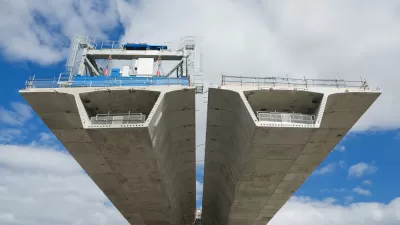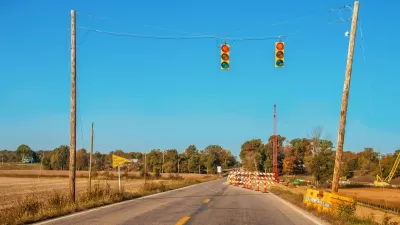Billions in federal infrastructure funding slated to go to states with few strings attached could fund roadway construction and widening projects that will raise greenhouse gas emissions and worsen climate change.

As the Biden administration prepares to distribute billions in infrastructure funding to state and local agencies, Brad Plumer writes, some experts caution that the funds could inadvertently worsen climate change by supporting road widening and construction projects.
"The new $1 trillion infrastructure law invests billions in climate-friendly programs like electric car chargers and public transit. But it also gives states $273 billion for highways over five years, with few strings attached. One analysis from the Georgetown Climate Center found that this money could significantly increase emissions if states keep adding highway lanes."
Increasingly, experts warn that if states want to slash planet-warming emissions from cars and trucks, it won’t be enough to sell more electric vehicles. They’ll also have to encourage people to drive less. In a nation built around the automobile, that’s not easy.
Kevin DeGood, director of infrastructure policy at the Center for American Progress, calls the plans for roadway expansion being proposed by many states "a major blind spot for politicians who say they care about climate change." Environmentalists point to the well-documented phenomenon of induced demand: when roads get bigger, more people choose to drive on them, and congestion quickly returns to the same levels as before.
While the Federal Highway Administration has issued 'guidance' that urges states to focus on repairs and maintenance before building new or expanded roads, as we noted earlier this week, some top Republican lawmakers encouraged governors to ignore the FHWA's recommendations.
FULL STORY: How Billions in Infrastructure Funding Could Worsen Global Warming

Maui's Vacation Rental Debate Turns Ugly
Verbal attacks, misinformation campaigns and fistfights plague a high-stakes debate to convert thousands of vacation rentals into long-term housing.

Planetizen Federal Action Tracker
A weekly monitor of how Trump’s orders and actions are impacting planners and planning in America.

In Urban Planning, AI Prompting Could be the New Design Thinking
Creativity has long been key to great urban design. What if we see AI as our new creative partner?

How Trump's HUD Budget Proposal Would Harm Homelessness Response
Experts say the change to the HUD budget would make it more difficult to identify people who are homeless and connect them with services, and to prevent homelessness.

The Vast Potential of the Right-of-Way
One writer argues that the space between two building faces is the most important element of the built environment.

Florida Seniors Face Rising Homelessness Risk
High housing costs are pushing more seniors, many of them on a fixed income, into homelessness.
Urban Design for Planners 1: Software Tools
This six-course series explores essential urban design concepts using open source software and equips planners with the tools they need to participate fully in the urban design process.
Planning for Universal Design
Learn the tools for implementing Universal Design in planning regulations.
Gallatin County Department of Planning & Community Development
Heyer Gruel & Associates PA
JM Goldson LLC
City of Camden Redevelopment Agency
City of Astoria
Transportation Research & Education Center (TREC) at Portland State University
Jefferson Parish Government
Camden Redevelopment Agency
City of Claremont





























